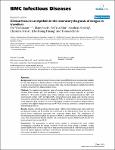Clinical features and pitfalls in the laboratory diagnosis of dengue in travellers
Wichmann, Ole
Stark, Klaus
Shu, Pei-Yun
Niedrig, Matthias
Frank, Christina
Huang, Jyh-Hsiung
Jelinek, Tomas
Background: Several enzyme-linked immunosorbent assay (ELISA)-kits are commercially available for the rapid diagnosis of dengue infection, and have demonstrated good sensitivity and specificity in paired serum samples. In practice, however, often only one blood sample is available from febrile travellers returning from dengue endemic areas. Methods: To evaluate the diagnostic value of positive dengue antibody-titres performed by a standard ELISA (PanBio IgM- and IgG-ELISA) in single serum samples (regarded as "probable infection"), 127 positive samples were further analyzed using envelope/membrane IgM-, and nonstructural protein 1 IgM- and IgG-ELISAs, immunofluorescence assays, and real-time reverse transcription polymerase chain reaction assays (RT-PCR). A combination of the test-results served as the diagnostic "gold standard". A total of 1,035 febrile travellers returning from dengue-endemic countries with negative dengue-serology and RT-PCR served as controls to compare clinical and haematological features. Results: Overall, only 64 (positive predictive value = 50%) of the probable cases were confirmed by additional analysis and 54 (42.5%) were confirmed to be "false-positive". Rash was the only clinical feature significantly associated with confirmed dengue fever. The combination of thrombocytopenia and leucopenia was present in 40.4% of confirmed and in 6.1% of false-positive cases. Thus, the positive predictive value for the combination of positive PanBio-ELISA plus the two haematological features was 90.5%. Conclusion: The examination of paired serum samples is considered the most reliable serodiagnostic procedure for dengue. However, if only one blood sample is available, a single positive ELISA-result carries a high rate of false-positivity and should be confirmed using a second and more specific diagnostic technique. In the absence of further testing, platelet and white blood cell counts are helpful for the correct interpretation.
Dateien zu dieser Publikation
Keine Lizenzangabe
Verwandte Publikationen
Anzeige der Publikationen mit ähnlichem Titel, Autor, Urheber und Thema.
-
2014-01-23ZeitschriftenartikelAutochthonous dengue virus infection in Japan imported into Germany, September 2013 Schmidt-Chanasit, Jonas; Emmerich, Petra; Tappe, D.; Günther, Stephan; Schmidt, S.; Wolff, D.; Hentschel, K.; Sagebiel, Daniel; Schöneberg, Irene; Stark, Klaus; Frank, ChristinaIn September 2013, dengue virus (DENV) infection was diagnosed in a German traveller returning from Japan. DENV-specific IgM and IgG and DENV NS1 antigen were detected in the patient’s blood, as were DENV serotype 2-specific ...
-
2010-09-14ZeitschriftenartikelPhylogenetic history demonstrates two different lineages of dengue type 1 virus in Colombia Mendez, Jairo A.; Usme-Ciro, Jose A.; Domingo, Cristina; Rey, Gloria J.; Sanchez, Juan A.; Tenorio, Antonio; Gallego-Gomez, Juan C.Background: Dengue Fever is one of the most important viral re-emergent diseases affecting about 50 million people around the world especially in tropical and sub-tropical countries. In Colombia, the virus was first ...
-
2010-10-07ZeitschriftenartikelDengue virus infection in a traveller returning from Croatia to Germany Schmidt-Chanasit, Jonas; Haditsch, M.; Schöneberg, Irene; Günther, Stephan; Stark, Klaus; Frank, ChristinaDengue virus (DENV) is endemic in south-east Asia and Central to South America. In August 2010, a DENV infection was diagnosed in a German traveller returning from a trip to Croatia in south-east Europe. The patient presented ...

